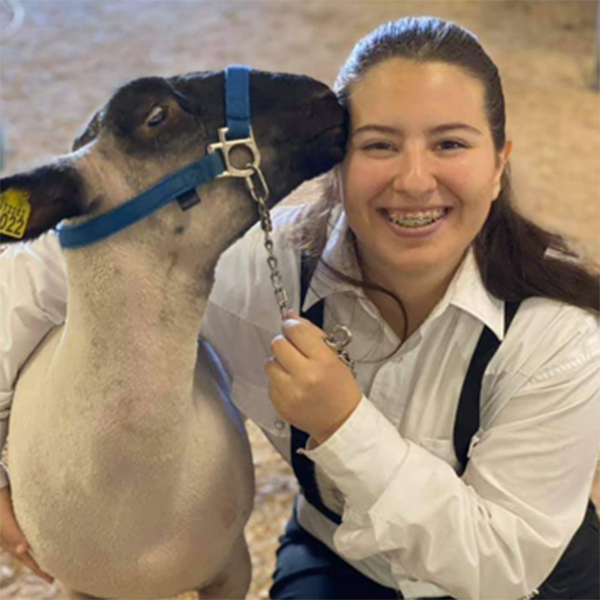In this edition
- 4-H summer camps to keep youth engaged and learning
- Extension offers trainings to help address state’s high suicide rates among youth
- Nevadans give feedback on youth education delivery during pandemic
- Volunteer Kimberly Loghry teaches youth a wide variety of skills
- Congratulate our 4-H graduating seniors
About our College
A founding college of the University, we have a long tradition of excellence in teaching, research and engagement programs that benefit the health and economic vitality of Nevada. We offer programs in:
- agriculture, horticulture, rangeland & veterinary sciences
- biochemistry & molecular biology
- children, youth & families
- community & economic development
- health & nutrition
- natural resources & environmental science
4-H summer camps to keep youth engaged and learning
Extension continues tradition of overnight and day camps
By Claudene Wharton

Youth at the Nevada State 4-H Camp enjoy a sunset on the shores of Lake Tahoe. Photo by Robert Moore.
In addition to the many ongoing local 4-H club and youth activities that are happening across the state, the Nevada 4-H Youth Development Program will also offer some summer day camps and overnight camps for youth this year, following a Nevada tradition that goes back 80 years.
“We are really happy to have received the green light to offer some 4-H day camps and overnight camps this summer,” said Carrie Stark, Nevada 4-H program director with University of Nevada, Reno Extension. “Working with the University and local authorities, we’ll be able to provide some great learning experiences for youth over the summer, following all necessary precautions related to COVID.”
Stark said that many of the camp organizers are still finalizing details, and that additional 4-H camp and summer activities may still be added. She advises parents to check with their local Extension offices for the most up-to-date 4-H camp and summer opportunities. Here are some of the 4-H day camps and overnight camps already in the works.
DAY CAMPS
Nevada 4-H day camps vary throughout the state, and are sometimes offered in partnership or collaboration with other organizations. Some are open to youth from the general public, while others help fill in gaps for children who attend community centers or other programs. All programs are based on research-based 4-H youth development principles and curriculum, engaging youth in positive learning experiences. Some of the day camps to be offered include:
Extension’s A.D. Guy Summer Day Camp - A.D. Guy Knowledge Center, 817 N. Street, Las Vegas
This six-week day camp offers youth a safe and inclusive environment to learn and participate in weekly themed, hands-on activities. Themes such as STEAM, underwater adventure and kitchen science are just a few of the topics they will explore. Space is limited to 20 youth in-person and 20 students virtually. Lunch will be provided to in-person campers, and registration is required. Register online for the A.D. Guy Summer Day Camp.
- June 14 – July 23, Monday – Friday, 10 a.m. – 2 p.m. (Closed July 5 for Independence Day)
- For Clark County youth, ages 7 – 13
- Cost for the six-week camp is $15 per child
- For more information, call 702-998-0223 or email the A.D. Guy Knowledge Center.
4-H Summer Adventures Day Camps 2021 - Extension Lifelong Learning Center, 8050 S. Paradise Road, Las Vegas
The 4-H Summer Adventures Day Camps are three different camps designed to help children learn and grow. Youth will play games, be physically active and learn valuable life skills in a fun and safe setting. Campers must bring their lunch. Light snacks will be provided. Space is limited, and registration is required. Register for the 4-H Summer Adventures Day Camps online.
- The three sessions are:
- June 7 – 11, Sizzling Summer STEM
Youth become a scientist for the week, doing hands-on activities spanning across different scientific fields. Great for inquisitive young minds looking to learn about the natural and technological world.
- June 14 – 18, Lead Your LYFE! (Loving Yourself First is Everything!)
This camp will create a safe space for preteens to discover their identity and what makes them “tick.” Healthy adults begin as youth who practice expressing their beliefs, feelings and dreams effectively.
- June 28 – July 2, Mix It Up!
This camp provides a variety of activities from which youth can choose, giving them great ideas on how to live life healthier and happier.
- All three sessions are Monday – Friday, 8 a.m. – 4 p.m.
- All three sessions are for Clark County youth, ages 9 – 12
- Cost is $50/week per child
- For more information, call 702-948-5905 or email Luisa Ixmatlahua-Garay.
Leading the Mucc Day Camp, Humboldt County
Humboldt County 4-H is partnering with Up from the Mucc, a new local youth organization serving underserved youth, to deliver two sessions of this youth leadership day camp, where participants will learn leadership and community engagement skills. Campers must bring their lunch. Prepackaged snacks and bottled water will be provided. Space is limited, and registration will be required.
- The two sessions are: June 15 – 17 and July 20 – 22
- Both sessions are Tuesday – Thursday, 8 a.m. – 4 p.m.
- Both sessions are for Humboldt County youth, ages 12 – 14
- Cost: Free
- For more information, call 775-623-6304 or email Sharon Barton.
Trailblazers Day Camp, Humboldt County
Humboldt County 4-H is partnering with Nevada Outdoor Schools to host two sessions of this camp where youth will learn a multitude of outdoor concepts and skills, including Leave No Trace principles, outdoor ethics, map reading, directional skills, outdoor safety, outdoor cooking, trail hiking and conducting a service project. Campers must bring their lunch. Pre-packaged snacks and bottled water will be provided. Space is limited, and registration is required. Register for Trailblazers Day Camp, Humbolt County online.
- The two sessions are: June 22 – 25 and July 27 – 30
- Both sessions are Tuesday – Friday, 8 a.m. – 4 p.m.
- Both sessions are for Humboldt County youth, fourth – eighth grades
- Cost is $50/session per child
- For more information, email Allana Havernick or Holly Gallian.
4-H Washoe County Day Camp for Youth at the Women and Children’s Center of the Sierra
These camps are only available to youth ages 6 and up who are already registered at and using the Women and Children’s Center Sierra in southeast Reno. The Center provides services to support women as they work to move out of poverty and improve their lives. These free day camps for youth at the center will consist of STEAM (science, technology, engineering, art, math), and will be conducted three hours a day, four days a week, for four or five weeks in June and July. For more information on the Center and its services, call 775-825-7395.
OVERNIGHT SUMMER CAMPS
The overnight summer camps will all be held at the Nevada State 4-H Camp, 1 4-H Road, Stateline, Nevada. The 32-acre camp sits on the south shore of Lake Tahoe and is owned and operated by the University of Nevada, Reno. Youth build lifelong memories and friendships at the camp, as well as learn life, leadership and citizenship skills. The setting provides an unparalleled opportunity for outdoor environmental education and STEM-related, hands-on learning activities. There’s also plenty of time for 4-H campers to participate in and learn about healthy, physical activities, such as shooting sports, kayaking, swimming and more. The four overnight camps are:
Mineral County / Native American Reservations 4-H Camp
- July 8 – 11
- For youth ages 9 – 13, with first priority given to youth from Mineral County and Nevada’s Native American reservations.
- Cost is $125 per camper
- For more information, call 775-945-3444, ext. 1039 or email Staci Emm.
Northern Nevada 4-H Camp
- July 11 – 17
- For youth ages 9 – 12, from Washoe, Douglas and Storey Counties; and Carson City.
- Cost is yet to be determined
- For more information, call 775-336-0259 or email Sam Mitchell.
Central Nevada 4-H Camp
- July 18 – 24
- For youth ages 9 – 13, from Churchill, Pershing, Lyon, Eureka, Elko and Humboldt Counties
- Cost is yet to be determined
- For more information, call 775-423-5121 or email Karen Bogdanowicz.
Health Rocks! 4-H Camp
Partially funded by a 4-H Health Rocks! grant from National 4-H Council, this special program applies 4-H’s successful positive youth development model to the challenge of reducing tobacco, alcohol, e-cigarette/vaping and drug use. Health Rocks! instills in youth participants invaluable confidence and communication skills necessary to make responsible decisions and develop the internal strength to resist risky behaviors.
- July 5 – 8
- For youth ages 11 – 13, with first priority given to youth from Washoe, Churchill, Elko, White Pine and southern Nye Counties
- Cost is yet to be determined
- For more information, call 775-784-4779 or email Carrie Stark.
Extension offers trainings to help address state’s high suicide rates among youth
4-H Program to provide additional trainings in communities
By Hannah Alfaro

The 4-H Youth Development Program trained faculty and staff on how to identify warning signs, and question, persuade and refer youth who may be at risk for suicide.
According to the Nevada Coalition for Suicide Prevention, suicide is the second leading cause of death for ages 10 to 34 in the state. To help address this, University of Nevada, Reno Extension's 4-H Youth Development Program recently conducted a training for 15 faculty and staff members to teach them steps they can take to help prevent suicides, especially among Nevada’s youth.
The training is called “QPR” training, which stands for question, persuade and refer. Just as people trained in CPR help save thousands of lives each year, people trained in QPR also help save lives by learning how to recognize the warning signs of a suicide crisis, and how to question, persuade and refer someone to help. Together, through their 4-H responsibilities, the 15 Extension professionals completing the training have contact with over 38,000 youth and 2,000 adult volunteers each year.
The training was conducted by Brenda Freeman, professor of counseling and educational psychology and Extension specialist at the University, who has provided counseling for more than 30 years.
In addition to the state’s high suicide rates, other factors point to the need for such training. For example, a youth needs assessment recently conducted by Extension, the University’s College of Education & Human Development, and the Nevada Department of Education identified support for youth’s emotional and mental health as a high need across the state.
“This training is really essential for our staff who are regularly working with young people,” Carrie Stark, Nevada 4-H program director, said. “The more people in the community who understand what the warning signs and prevention techniques for suicide risk are, the lower the suicide rates in that community become.”
To that end, Stark said Extension is going to offer “train-the-trainer” sessions this summer, so that Extension staff throughout the state will be able to provide training sessions for others in their communities.
“It doesn’t take that much to learn this, just like learning CPR,” Stark said. “We really think Extension can light a spark in communities to help provide mental health support for our youth, and to save some lives.”
For more information about future trainings, email Carrie Stark.
Nevadans give feedback on youth education delivery during pandemic
University publishes youth needs assessment results
By Tiffany Kozsan
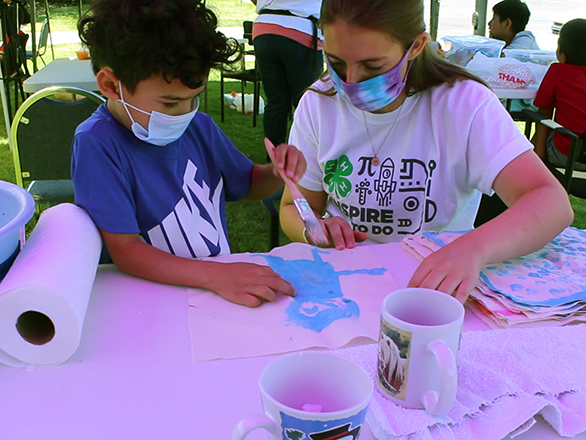
Joseph M., from Washoe County, learns how to do batik, a method of dying cloth using wax and dye, at a 4-H STEAM Day Camp during the COVID-19 pandemic while following all COVID-19-related requirements at the time. Photo by Samantha Shoupe.
With the COVID-19 pandemic forcing many children and youth to engage in distance learning, there have been concerns about the students’ educational opportunities, mental health and access to resources. According to a statewide survey conducted by the University, communication, quality of distance education, interactive and engaging distance learning, and social-emotional health of students were among the most important educational issues of the pandemic. Of the survey respondents, who were families, school personnel and community members, only 47% were satisfied with the school districts’ pandemic response, and only 36% felt the school year was going good or very good. Individuals from rural school districts responded more positively to both questions than those from urban districts.
University of Nevada, Reno Extension, a unit of the University’s College of Agriculture, Biotechnology & Natural Resources, partnered with the University’s College of Education & Human Development and the Nevada Department of Education to develop and distribute the survey.
The survey was created in response to a request from the Nevada Association of Counties to help identify youth needs and high-quality educational activities and programs to support their academics and mental health during COVID-19. The survey was designed to identify what stakeholders consider most important for ensuring the academic success, health and well-being of youth, and lessons learned in terms of pre-K-12 education delivery during the pandemic in Nevada.
Over 1,300 people responded to the survey, and the team received over 2,000 comments. The results are compiled and published in a report, “Nevada Stakeholder Perceptions of Youth Educational and Mental Health Needs During the Pandemic.”
“The information gained from this statewide study will aid counties in providing resources and support for Nevada youth and families,” Dagny Stapleton, executive director for the Nevada Association of Counties, said. “As always, we appreciate the partnership between Nevada's counties and Extension."
Extension Associate Director Shannon Horrillo, who helped conduct the survey, said the assessment highlighted several lessons learned that can inform post-pandemic educational delivery. For example, many respondents identified increased and frequent communication among students, families, teachers and administrators as one of the positive aspects of the COVID response in school. Having clear and consistent expectations at the school- or district-level also emerged as a lesson learned. In addition, many respondents were happy with the increased access to technology and internet services, when made available, to support educational work in a variety of instructional delivery models.
The survey also exposed needs, such as better internet and technology access and support for both educators and students, especially in rural areas. Respondents also expressed that distance learning is not meeting the unique educational needs of children with disabilities, especially those with significant disabilities and those with low-incidence disabilities. Finally, the toll of the pandemic on youth’s mental health and learning was clear in the data received.
“My oldest, fifth grade, has had to start seeing a therapist because he feels ‘worthless’,” wrote one parent in response to an open-ended question. “My middle child, third grade, is having angry outbursts. My kindergartener has gone from being a happy, fun ray of sunshine to being a crabby monster. She cries all day long about how this isn’t ‘her school’, and she is barely absorbing information because she can’t use the computer without help, but I have two other kids to help and a 2-year-old.”
“Youth development doesn’t happen just inside the classroom,” Horrillo said. “That’s where ‘wrap around services’, such as mental health services, family support services, and programs such as Extension’s 4-H Youth Development Program, come in. We want to help connect families and schools to these types of resources and programs.”
Based on their findings and lessons learned, the team plans to collaborate with stakeholders across the state to help address current and future needs to support the education of Nevada’s youth. The team has developed a website where the public can access the initial report and subsequent reports. Individuals wanting information about the quantitative data can email the 4-H team at tmendibles@unr.edu. Families, educators and community members will also find an online resource guide with existing programs and resources that support the academic success and mental health of Nevada youth.
The team also plans to explore the survey data more thoroughly and develop additional publications to help guide decisions surrounding education, education delivery, and youth’s emotional and mental health.
Horrillo said last year, more than 49,804 youth participated in Nevada 4-H clubs, after-school programs, camps and other 4-H activities. The Nevada 4-H Youth Development Program is a learn-by-doing life-skills program that teaches youth communication, self-concept, team-building, problem-solving, decision-making, self-responsibility, conflict resolution, aspiration-building, goal-setting, community leadership and career development. For more information on Nevada 4-H or the “Nevada Stakeholder Perceptions of Youth Educational and Mental Health Needs During the Pandemic” report, email Horrillo.
According to the statewide survey conducted by the University...

46%
Of survey respondents were satisfied with the school districts’ pandemic response

36%
felt the school year was going good or very good
Individuals from rural school districts responded more positively to both questions than those from urban districts
Volunteer Kimberly Loghry teaches youth a wide variety of skills
4-H volunteer is leading several programs in White Pine County
By Hannah Alfaro
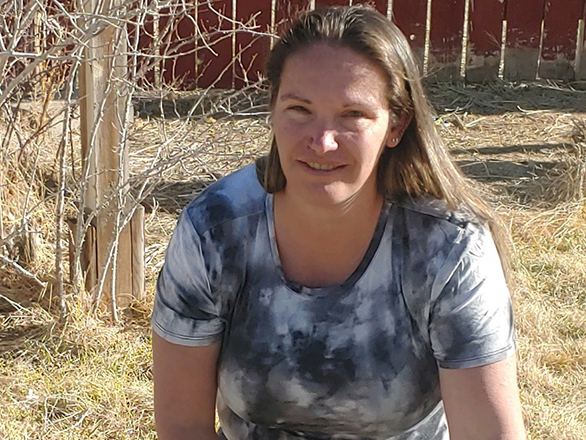
Kimberly Loghry leads multiple clubs, impacting youth across White Pine County.
Kimberly Loghry has been a volunteer for the 4-H Youth Development Program in White Pine County for over nine years, and now leads a wide variety of clubs including tractor, cat care, dog care and training, shooting sports, and many others.
After her two kids started participating in 4-H when they were young, Loghry saw the need for volunteers and decided to start learning all that the program had to offer alongside them. In addition to her project club leadership, she also took on the role of leader for the Blue Ribbon Club, the community club for youth who live in the city of Ely, this year, which is one of the largest 4-H community clubs in White Pine County, and provides a broad variety of activities rather than specializing in one special interest.
She’s inspired to be a successful leader by the kids in her clubs. In dog care and training, she works with youth from June to August and helps them build skills in leadership and learn about topics they are passionate about. Her tractor club also helps youth build leadership and teamwork skills by allowing youth who are knowledgeable about farming to teach and help others.
“Working with all of the kids is a blast,” Loghry said. “It’s amazing to see them come into the clubs wanting to learn and working hard to develop news skills. It’s really obvious with something like shooting sports, where kids come in with no experience using a rifle, and they progress so fast.”
Although health restrictions over the past year have disrupted in-person clubs, Loghry has made it her mission to make sure youth stay hopeful and motivated. She’s been able to adapt a lot of her programs to follow social-distancing guidelines, which she believes had a large positive impact on participants during a difficult time.
“Kim’s enthusiasm for taking on new clubs and projects is matched only by her skills and competence in teaching youth,” said Alexandra Santaella, Extension community based instructor. “She has a huge heart, and is always offering up her time, skills, land and financial support for all 4-H youth activities. Kim is an invaluable asset to 4-H, and we are very lucky to have her.”
Congratulations to all of our 4-H graduating seniors
Here is just a small sample and their plans after high school
Chloe Young, Washoe County Chloe has been participating in 4-H for 11 years in horse club. She is planning to attend a college with a great equine science program.
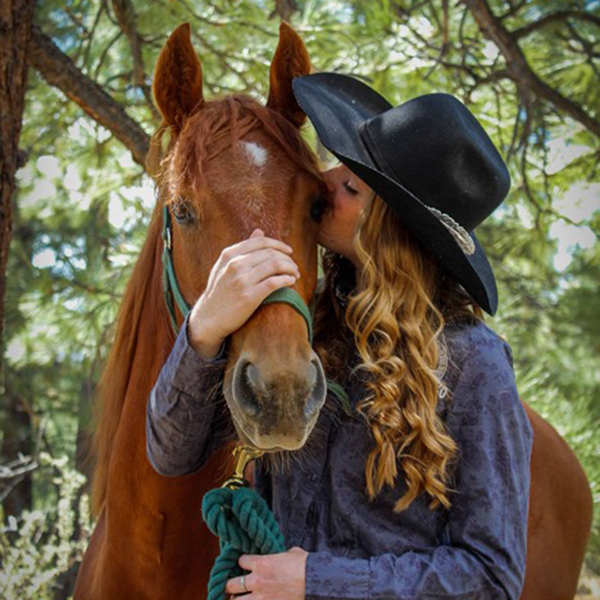 Kayden Syme, Elko County Kayden has been participating in 4-H for nine years in rabbits, goats, poultry, shooting sports, and as a county officer. He's attending the University of Nevada, Reno for engineering.
Kayden Syme, Elko County Kayden has been participating in 4-H for nine years in rabbits, goats, poultry, shooting sports, and as a county officer. He's attending the University of Nevada, Reno for engineering.
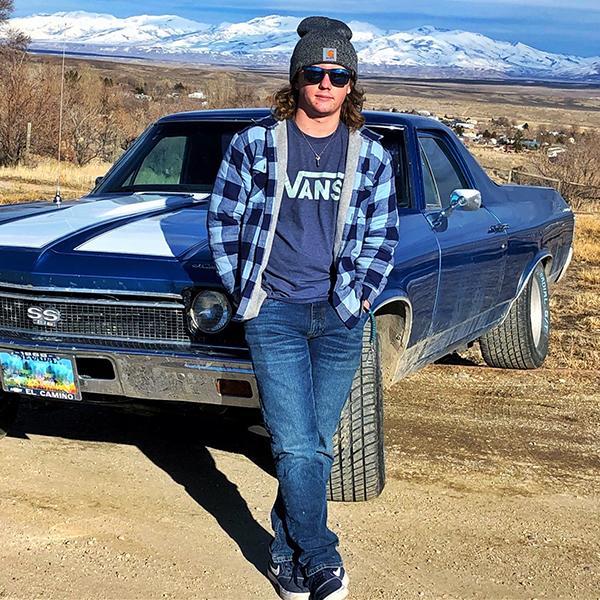 Dalton McNeff, Pershing County Dalton has been participating in 4-H for eight years in sheep-market and breeding, livestock judging, and camp counseling. He's attending the College of Idaho for marketing and media management.
Dalton McNeff, Pershing County Dalton has been participating in 4-H for eight years in sheep-market and breeding, livestock judging, and camp counseling. He's attending the College of Idaho for marketing and media management.
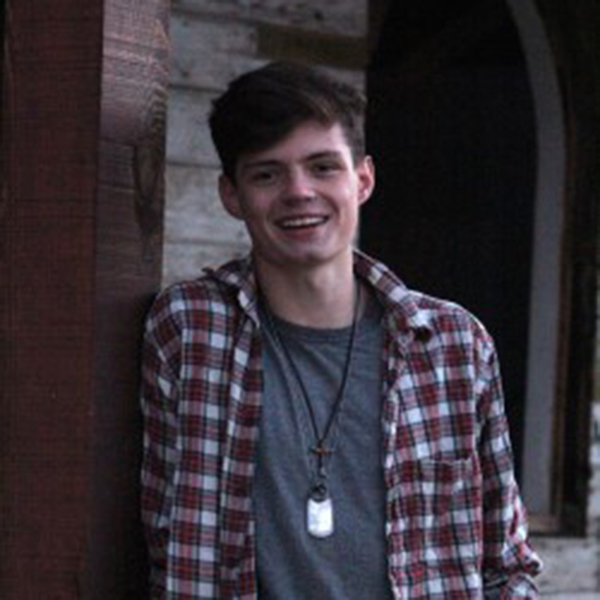 Veronica Dederer, Clark County Veronica has been participating in 4-H for 10 years in market lamb. She is attending Northern Arizona University for microbiology.
Veronica Dederer, Clark County Veronica has been participating in 4-H for 10 years in market lamb. She is attending Northern Arizona University for microbiology.
